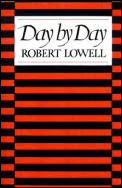 All his life Lowell was trying to become comfortable with imperfection and in Day by Day he does. The book was an open door for him and it contains the most flexible verse he ever wrote. The fourteen-line girdle is gone. While retaining always the integrity of the line, he seemed to let his thoughts drift where they would, sometimes dredging, sometimes drifting, but following his Muse. Many of the poems directly confront the question of his art—but he gives himself the freedom here that he sought in Life Studies and then backed away from in successive books. Some of the key poems are “Ulysses and Circe,” “Last Walk,” “Since 1939,” “Are of the Possible,” “In the Ward,” “Death of a critic,” “Domesday Book,” “The Spell,” “The Withdrawal,” “Wellesley Free,” “Grass Fires,” “ Turtle,” “Visitors,” “Shifting Colors,” and “Unwanted.”
All his life Lowell was trying to become comfortable with imperfection and in Day by Day he does. The book was an open door for him and it contains the most flexible verse he ever wrote. The fourteen-line girdle is gone. While retaining always the integrity of the line, he seemed to let his thoughts drift where they would, sometimes dredging, sometimes drifting, but following his Muse. Many of the poems directly confront the question of his art—but he gives himself the freedom here that he sought in Life Studies and then backed away from in successive books. Some of the key poems are “Ulysses and Circe,” “Last Walk,” “Since 1939,” “Are of the Possible,” “In the Ward,” “Death of a critic,” “Domesday Book,” “The Spell,” “The Withdrawal,” “Wellesley Free,” “Grass Fires,” “ Turtle,” “Visitors,” “Shifting Colors,” and “Unwanted.”
As with Life Studies and History, the first poem in Day by Day, “Ulysses and Circe,” contains a line that could define Lowell’s stance in the book” “Risk was his métier” (DBD 8). Gifted with an associative mind, he had previously shackled himself with fixed subject matter and forms. The formal devices used in these late poems are exaggerated versions of his earlier style. He uses more syntactical ambiguity in these poems, more unfinished thoughts, unusual line breaks, and enforced pauses between statements.
the houses still burn
in the golden lowtide steam of Turner.
Only when we start to go,
do we notice the outrageous phallic flare
of the splash flowers that fascinated children.
The reign of the kingfisher was short.
(“Domesday Book,” DBD 56)
“Domesday Book” is a gallant (rather than a chivalrous) poem and the language in it is unusually rich for late Lowell. In this passage he is saying that it’s too painful to perceive the ubiquitous sexuality of “splash flowers,” leaving the reader to fill in the adjectives this time—colorful, wet, startling, dazzling, agitated—and implying that we spend our lives holding our ears lashed to the mast like Ulysses confronted with the Sirens. Image the third line as
Only when we start to go
and we can see why the phrase is so charged—direct and suggestive. Here, words are particles that take hold of the air and never let go. “Outrageous phallic flare/of the splash flowers” stands for excess and exhaustion, desire and death, the longing to return to childhood undercut by the rasp of the aside which refuses this poet the balm of nostalgia. Intensity precludes longevity. The lumbering turtle, not the darting kingfisher, lives a long time. But the real risk, as Lowell perceived it, was to distinguish, for the poem, memory from imagination, fact from truth. Blake, for one, made a clear distinction between the two. Did Lowell? Lowell worried that he had become too reliant on “the threadbare art of [his] eye,” and paralyzed by the facts he recorded:
But nature is sundrunk with sex—
how could a man fail to notice, man
the one pornographer among the animals?
I seek to leave unimpassioned by my body,
I am too weak to strain to remember, of give
recollection the eye of a microscope. I see
horse and meadow, duck and pond,
universal consolatory
descriptive without significance,
transcribed verbatim by my eye.
(“Shifting Colors,” DBD 119-20)
Excerpt from forthcoming Robert Lowell and the Poetic Act (parlorpress.com) a revised version of Robert Lowell: An Introduction to the Poetry (Columbia, 1983)

